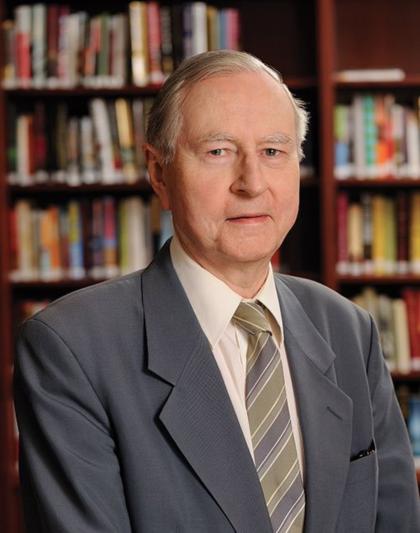Theoretical and atomic physicist Brian R. Judd, Gerhard H. Dieke Professor Emeritus in the William H. Miller III Department of Physics and Astronomy, died April 8, 2023, at the age of 92.

Image caption: Brian R. Judd
Judd was best known for his seminal rare-earth metals research behind the groundbreaking Judd-Ofelt Theory of 1962. At the time, interest in rare earth metals—now a pivotal player in fiber optic communications—was growing with the development of radar and microwave research, but scientists were puzzled to find that the metals and their ions produced very different signatures under spectrographic analysis. Judd's 1962 paper, "Optical Absorption Intensities of Rare-Earth Ions," proposed a mathematical method for predicting how the metals' f electrons behave when they jump from one energy level to another while orbiting the atom's nucleus—the first attempt to describe the elements' behavior at the subatomic level, where quantum theory replaces classical physics. The article continues to be cited more than 200 times a year.
"Brian's work in theoretical atomic physics, particularly his seminal studies of electronic transitions in rare-earth ions and the development of the Judd-Ofelt theory, is today textbook material," said Robert Leheny, professor and department chair. "Here in the department, Brian will be fondly remembered as a generous colleague and a real gentleman."
Born in Chelmsford, U.K., Judd learned piano at an early age and remained interested in classical music throughout his life. He graduated from Brasenose College, Oxford, with a degree in mathematics and physics. He held a research fellowship at Magdalen College, and served as instructor at the University of Chicago, chemist at the Lawrence Radiation Laboratory in Berkeley, and professeur-associé at the University of Paris.
After coming to Hopkins in 1966, Judd served as department chair from 1979 to 1984. Known for his ability to generate simple examples to illustrate complex problems, he remained interested in the mathematics of rare earth elements even after being named emeritus in 1997, continuing to try to understand the results produced by certain complicated electron configurations. "If you get too interested in the mathematics, you can spend a lifetime working it out," he said in 2012. "And in fact that's what happened to me. I've become seduced by the mathematics."
Judd served as served as a validator for the original release and publication in May 2010 of the NIST Digital Library of Mathematical Functions and the NIST Handbook of Mathematical Functions. His books include Operator Techniques in Atomic Spectroscopy, Second Quantization and Atomic Spectroscopy, Topics in Atomic and Nuclear Theory (with J. P. Elliott), and Angular Momentum Theory for Diatomic Molecules. He received the 1988 Spedding Award, sponsored by the chemical company Rhone-Poulenc, for rare-earth research. He was an Honorary Fellow of Brasenose College, Oxford University; and a Fellow of the American Physical Society.
Posted in University News
Tagged obituary







